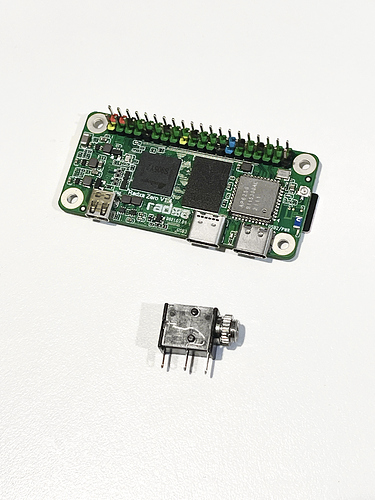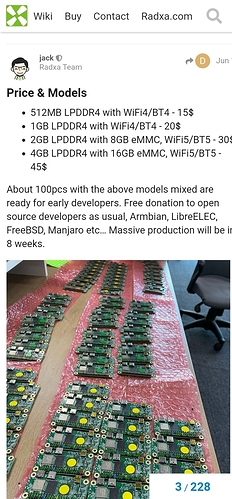Use Nand-SATA-Install from armbian-config.
Introduce the Radxa Zero
Keep thread updated… not working with beta4 img.
Unofficial Armbian Ubuntu based with changed theme / design, some stuff on top, GPL licence violation, …
There is not yet any Armbian for this board. Check: https://www.armbian.com/download/?device_support=Supported Please use term “unofficial” “test” “preview” “development” Armbian until then.
For official Armbian, try perhaps here.
Thank you! It took us years to develop this useful tool. Currently we are seeking for ideas and resources to rebuild complete configurator from scratch.
Otherwise, everything is in the docs: https://docs.armbian.com/User-Guide_Getting-Started/#how-to-install-to-emmc-nand-sata-usb In case you want to add something to them https://docs.armbian.com/Process_Contribute/
Those are images for usb boot and doesn’t work with sd card.
Please try it with a usb drive.
The shop says that radxa zero’s ‘micro sd uSD slot supports up to 128G uSD card’ .
Does this mean that the largest boot partition that can be recognized is 128G?
What happens if I place a micro uSD card of a larger size (e.g. 256G) ?
Will such a larger micro uSD card:
- be bootable as long as the first partition is <=128G?
- even if not bootable, can still be used as an external non-bootable flash drive?
USB audio recording works on Zero using different audio inputs: XLR, 1/4" Line in, TRS, and RCA.
Every single USB audio interface I own has worked like a champ on Zero board running TwisterOS Beta4 for audio input recording. Latest Audacity 2.3.3 tested. Amlogic USB audio codec on Zero working great.
Tested it so far with: Roland UA-1EX(USB audio interface), Zoom R24(USB multitrack recorder), Allen & Heath ZED 12FX(USB Multitrack Mixer), Behringer UCA-222 (USB audio interface)
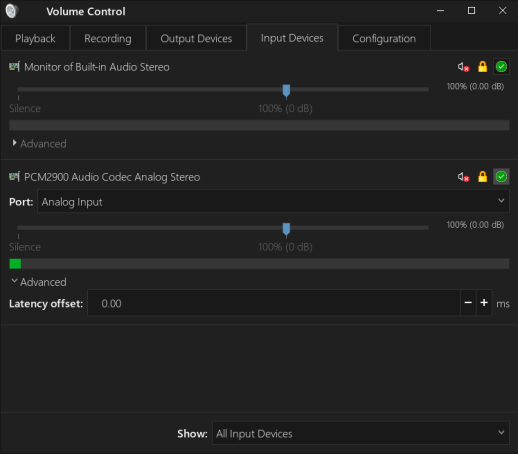
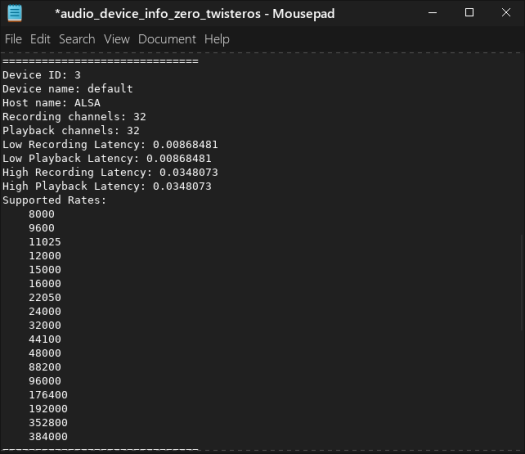
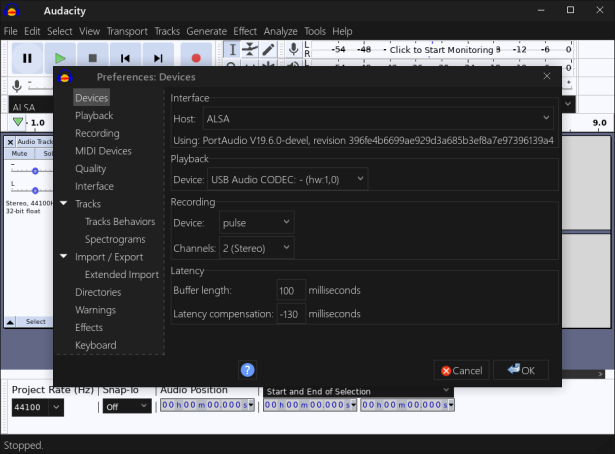
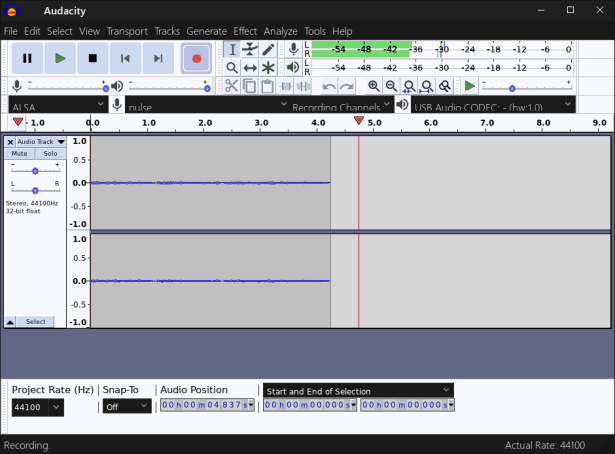
As soon as this is available, let me know. I’ll pre-order
An initial device-tree for the Zero has now been merged and queued for Linux 5.16: https://git.kernel.org/pub/scm/linux/kernel/git/amlogic/linux.git/commit/?h=v5.16/dt64. The USB ports defined are currently just normal ports. I have a patch for adding USB-C capabilities but the fusb302 driver needs some polarity work before things will probe correctly. Normal USB support works fine for now. If you are using 5.14 or 5.15 kernel sources you will also need https://github.com/chewitt/linux/commit/013d941609d7cd0f59bba6be852db4e98e31eec9 else SDIO WiFi module will not probe and load firmware correctly.
I’ve also submitted initial board support to u-boot, but those patches are unlikely to be accepted before the matching kernel changes appear in torvalds/master so 2022.01 will be the release that gets them.
Since you’re at it, would you know if it’s possible to achieve in the current mainline state something similar to what is done here: https://github.com/BayLibre/ffmpeg-drm but for zero radxa? Or with any other kernel?
The VDEC is a problem on all Amlogic hardware. There is partial support for H264 and VP9 upstream but HEVC is missing (we have patches, but rather rough on newer hardware) and the kernel driver really needs to be reworked and split to better handle the memory needs of older vs. newer Amlogic hardware generations. The developer who was originally working on it had to stop for personal reasons in late 2019, then Google changed funding priorities and work that was already stalled, stopped. Since then nothing happened beyond dusting off some WIP code for HEVC. The upstream H264 and VP9 drivers are technically meeting kernel V4L2 compliance, but more work is needed in ffmpeg (and the drivers) to get the userspace side working well. The Raspberry Pi foundation devs have done some of the work to get H264 working well with ffmpeg v4l2m2m in their codebase, but beyond a point the improvements need to be matched with driver tweaks and Amlogic has nobody to make the tweaks.
This is THE challenge. Most of the Amlogic community developers are either lacking the architectural talent to write modern drivers from scratch and/or are simply content to fiddle around the edges of the vendor kernel which is ugly-arse code but more feature complete. So there isn’t really anyone to do the work, and this is the status-quo for two years now. Unless someone competent just appears out of nowhere willing to make a large personal and pro-bono effort, the most likely route forwards will be organising a group of commercial backers with an interest in upstream Amlogic SoC support to pool funding and pay Baylibre to do the work. To write, test, refine, and upstream drivers and userspace code has been estimated at 5-8 months work for a professional developer, which means it’s a non-trivial sum to raise. Based on the similar effort I’ve first-hand witnessed the Pi Foundation devs make for RPi4 support it’s probably a low-side estimate.
To a lesser extent the audio drivers also need attention to add support for IEC958 pass-through, but that’s partly due to a dependecy on dw-hdmi and the Allwinner/Rockchip community devs will probably tackle that with time.
It seems like some people ready have one. Is it only available to influencers right now? I’d buy the the day you make it available.
Hi all,
I ordered (or preordered, whichever) the D4E16H model from ALLNET China roughly three weeks ago and got it (in Ohio USA) the other day. And I’m nobody at all. 
edit: apparently their store allowed me to select no header and onboard antenna even though there’s no such combination listed on the linked page with SKUs, which may be why I still got the header. It seems to be the store’s problem, and according to the page’s feature selection function, it looks like I underpaid by $0.80.
Can you send a link?
That’s great! But the listed price here for 4gb ram is $45 but the linked site is selling at $85
There are 4 basic variations (or models or whatever) with 4GB RAM. $45, $55, $65, and $85 are for the available eMMC sizes-- 16GB, 32GB, 64GB, 128GB, respectively.
Armbian + Twister OS delivering value once more!
Let’s see if wiring a 3.5mm audio jack for input would get the board to capture sound.
@Stephen mentioned there is no ability for GPIO audio in but @jtremblant your from your discord…
The audio jack channels (left and right) are provided by PWM driven GPIO (channel 0 by GPIO 12 or 18, and channel 1 by GPIO 13 or 19).
@jack can you validate if these GPIO PINS can get audio in?
That list corresponds to the first half of this list. I picked that same $45 model because I need CPU, RAM, and GPIO more than anything else.
Oh I just saw. If you don’t need 128gb emmc then you can get a $45 one. Nice.
Edit: I have a ton of micro SD cards lying around so I don’t need the onboard storage. I’m more excited about 4gb of ram on a zero form factor SBC.
